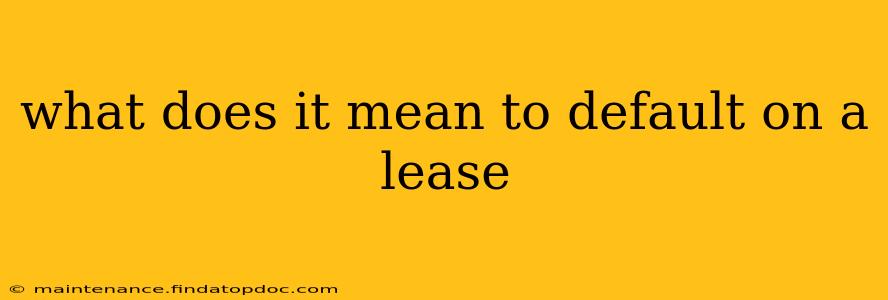What Does It Mean to Default on a Lease?
Defaulting on a lease means you've broken the terms of your rental agreement and failed to fulfill your obligations as a tenant. This is a serious matter with significant consequences. Understanding what constitutes a default and the potential repercussions is crucial for both landlords and tenants.
What are the common reasons for lease defaults?
This is a critical question, and the answer varies depending on the specifics of your lease agreement. However, some of the most frequent reasons for lease defaults include:
-
Non-payment of rent: This is the most obvious and common reason for default. Missing even a single rent payment, especially without communication with your landlord, can put you in default. Many leases specify a grace period, but exceeding this grace period will likely trigger a default notice.
-
Violation of lease terms: Your lease outlines specific rules and regulations you must adhere to. Violations can range from minor infractions like exceeding the allowed number of occupants to more significant issues such as illegal activities, property damage, or unauthorized pets. Each violation's severity will impact the landlord's response.
-
Failure to maintain the property: Most leases require you to maintain the property in a reasonably clean and habitable condition. Significant damage beyond normal wear and tear, neglecting repairs you're responsible for, or allowing the property to become unsanitary can all constitute a default.
-
Subletting without permission: Many leases prohibit subletting or assigning the lease to another party without the landlord's written consent. Doing so without permission is a clear breach of contract and a default.
-
Breach of addendums: Any addendums or amendments to your original lease agreement are legally binding and must be followed. Failure to comply with these additional terms can also lead to a default.
What happens if I default on my lease?
The consequences of defaulting on a lease can be severe and depend on your landlord's policies and local laws. Some possible repercussions include:
-
Eviction: This is the most common and drastic outcome. Your landlord will initiate the legal eviction process, which typically involves a formal notice to vacate and, if you fail to comply, court proceedings.
-
Late fees and penalties: Your lease likely outlines penalties for late rent or other breaches of contract. These fees can quickly accumulate and significantly increase your financial burden.
-
Damage claims: If you've damaged the property beyond normal wear and tear, your landlord can deduct the cost of repairs from your security deposit or pursue further legal action to recover damages.
-
Negative impact on credit score: Evictions and judgments related to lease defaults will likely be reported to credit bureaus, negatively impacting your credit score and making it harder to rent or obtain loans in the future.
-
Legal action: In some cases, landlords might pursue legal action beyond eviction to recover unpaid rent, damages, or other losses resulting from your default.
How can I avoid defaulting on my lease?
Preventing a lease default is the best course of action. Here are some proactive steps:
-
Read your lease carefully: Understand all the terms and conditions before signing. Ask your landlord to clarify anything you don't understand.
-
Budget for rent and other expenses: Ensure you can comfortably afford your rent and any other associated costs.
-
Communicate with your landlord: If you anticipate difficulties paying rent or fulfilling other lease obligations, contact your landlord as soon as possible. Open communication can often help find a solution.
-
Maintain the property: Keep the rental unit clean and well-maintained to avoid damage claims. Report any necessary repairs promptly.
-
Follow all lease terms: Adhere strictly to the rules and regulations outlined in your lease agreement.
What should I do if I'm facing eviction?
If you're facing eviction, seek legal advice immediately. A lawyer specializing in tenant rights can help you understand your options and protect your interests. Remember, understanding your rights and acting proactively can make a significant difference in the outcome.
By understanding the implications of defaulting on a lease and taking proactive steps, both landlords and tenants can avoid costly and stressful situations. Open communication and a commitment to fulfilling lease obligations are crucial for a positive rental experience.
